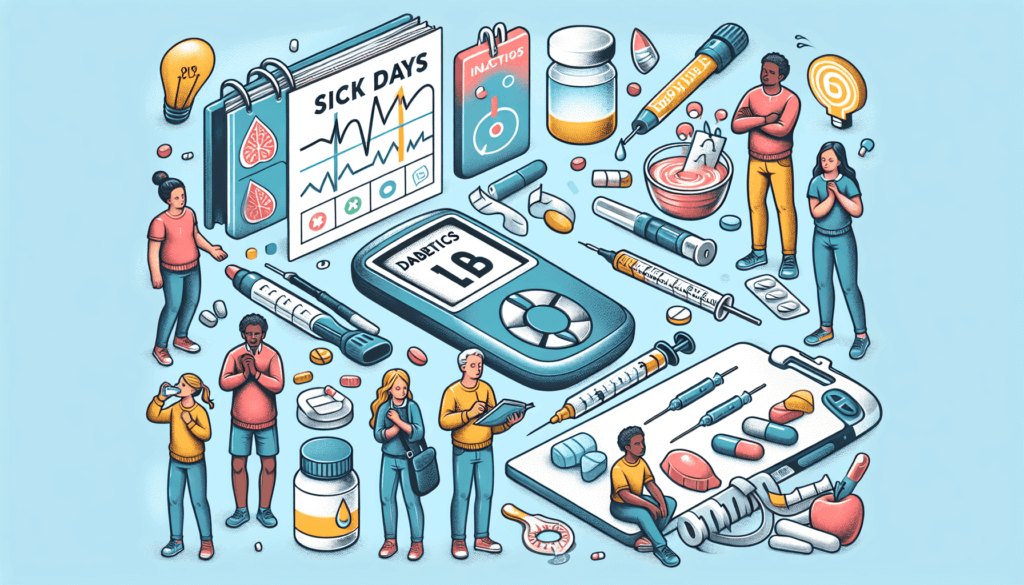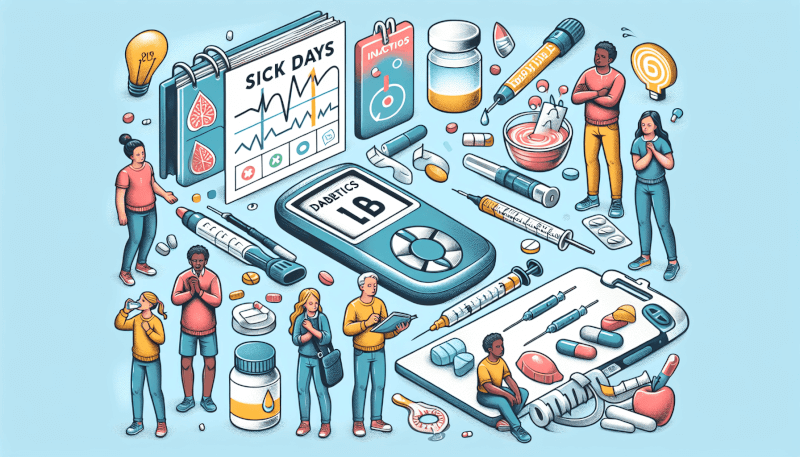Living with diabetes can be a daily challenge, but when sickness strikes, managing your diabetes can become even more critical. In this article, you’ll discover some useful tips and strategies for navigating sick days with diabetes, ensuring that you stay healthy and minimize any potential complications. Whether you’re dealing with a common cold or a more serious illness, these practical guidelines will help you take care of yourself during sick days, allowing you to recover and get back to your normal routine as quickly as possible.
Understanding Sick Day Management
What is Sick Day Management in Diabetes?
Sick Day Management in diabetes refers to the strategies and actions that individuals with diabetes need to take when they are feeling unwell or are experiencing an illness. It involves closely monitoring blood glucose levels, adjusting insulin dosage if necessary, ensuring proper hydration and nutrition, managing medications, and seeking medical assistance when needed.
Why is Sick Day Management Important?
Sick Day Management is crucial for individuals with diabetes because illnesses can have a significant impact on blood glucose levels. When you are sick, your body’s response to infection or illness can cause hormonal changes that can lead to elevated blood sugar levels. On the other hand, some illnesses may disrupt your normal routine, affecting your appetite, medication schedule, and physical activity levels, potentially leading to low blood sugar levels. Proper management during sick days can help prevent severe fluctuations in blood glucose levels and reduce the risk of complications.
Challenges in Sick Day Management with Diabetes
Managing diabetes during illnesses presents unique challenges. Illnesses, such as the flu or a cold, can cause elevated stress levels on the body, triggering the release of hormones that increase blood glucose levels. Additionally, when you are feeling under the weather, it can be difficult to maintain your usual routine and adhere to your diabetes management plan. Managing sick days in a way that minimizes disruptions to blood glucose control and supports overall well-being requires careful planning and proactive measures.
Preparing for Sick Days
Creating a Sick Day Management Plan
A crucial aspect of sick day management is creating a personalized plan that outlines the steps you need to take when you are sick. Work with your healthcare team to develop a comprehensive plan that includes instructions on monitoring your blood glucose levels, adjusting insulin dosages, managing medications, staying hydrated, and seeking medical assistance when necessary. Your plan should also include emergency contact information and any specific actions to take for high or low blood sugar levels.
Educating Yourself on Sick Day Management
Education is key to effective sick day management. Take the time to learn about how illnesses can affect blood glucose levels and the steps you can take to stay in control. Understand the signs and symptoms of hyperglycemia and hypoglycemia, as well as the actions you need to take in each situation. Stay up to date with the guidelines and recommendations provided by diabetes organizations and consult with your healthcare team for any questions or concerns.
Stocking up on Necessary Supplies
Before you get sick, it is essential to ensure that you have an ample supply of all the necessary diabetes management supplies. This includes blood glucose monitoring supplies, insulin, medication, ketone testing kits, and any other specific items recommended by your healthcare team. Having these supplies readily available will make it easier to manage your diabetes during sick days without unnecessary stress or last-minute scrambling.
Notifying Your Healthcare Team
Communication with your healthcare team is crucial during sick days. It is important to notify them when you are feeling unwell, especially if you are experiencing significant symptoms or changes in blood glucose levels. Your healthcare provider can provide guidance and support, adjust your treatment plan if necessary, and help you determine when it is appropriate to seek additional medical assistance.

Monitoring Blood Glucose Levels
Frequent Blood Glucose Testing
When you are sick, it is important to monitor your blood glucose levels more frequently than usual. Illnesses can cause blood sugar levels to fluctuate, and close monitoring will help you make informed decisions about insulin dosages and other medications. Follow the monitoring schedule outlined in your sick day management plan and record your results to share with your healthcare team during follow-up appointments.
Tracking Ketone Levels
During sick days, it is crucial to monitor ketone levels if you have type 1 diabetes or are at risk for diabetic ketoacidosis (DKA). Illnesses can trigger DKA, a potentially life-threatening condition characterized by high blood glucose and the presence of ketones. Use ketone testing kits to monitor your ketone levels as directed by your healthcare team. If ketone levels are high, follow the guidelines provided in your sick day management plan or contact your healthcare team for further instructions.
Adjusting Insulin Dosage as Needed
Illnesses can often impact your insulin requirements. Depending on your blood glucose levels, ketone levels, and other factors, your healthcare team may recommend adjusting your insulin dosages during sick days. Follow the guidance provided in your sick day management plan and consult with your healthcare team if you are unsure about dosage adjustments. It is essential to carefully track your blood glucose levels and ketone levels during the adjustment process to ensure optimal diabetes management.
Maintaining Hydration and Nutrition
Drinking Plenty of Fluids
Staying hydrated is crucial during sick days as it helps prevent dehydration, which can further complicate your illness and affect blood glucose levels. Drink plenty of fluids, including water, herbal tea, and sugar-free beverages. Avoid sugary drinks or fruit juices that can cause blood sugar spikes. If you are unable to keep fluids down due to nausea or vomiting, contact your healthcare team for guidance.
Choosing Nutrient-Dense Foods
Proper nutrition is important for supporting your immune system and managing blood glucose levels during sick days. Choose nutrient-dense foods that are rich in vitamins and minerals, such as fruits, vegetables, whole grains, and lean proteins. Avoid processed and sugary foods that can lead to blood sugar imbalances. If you have a poor appetite, try eating smaller, more frequent meals to ensure you are getting adequate nutrition.
Monitoring Carbohydrate Intake
When you are sick, it is important to pay attention to your carbohydrate intake to maintain stable blood glucose levels. Depending on your symptoms and blood glucose levels, you may need to adjust your carbohydrate intake. Work with your healthcare team to determine the appropriate amount of carbohydrates to consume during sick days, considering factors such as medication adjustments, insulin requirements, and activity levels.
Skipping Meals vs. Eating Small, Regular Meals
During illness, you may experience changes in your appetite and meal patterns. It is essential to continue fueling your body with regular meals or snacks, even if your appetite is reduced. Skipping meals can lead to low blood sugar levels, which can further compromise your well-being. Opt for smaller, more frequent meals or snacks if you are unable to tolerate large meals. Be mindful of the composition of your meals, focusing on a balance of carbohydrates, proteins, and healthy fats to support stable blood glucose levels.

Managing Medications
Taking Prescribed Medications as Usual
Continuing to take your prescribed medications as usual is an important aspect of sick day management. Unless otherwise instructed by your healthcare team, maintain your regular medication schedule to ensure consistent blood glucose control. This includes medications for diabetes management, as well as any other medications you take for other health conditions. If you have concerns about the impact of your medications during illness, consult with your healthcare team for guidance.
Adjusting Medication Schedule if Necessary
In some cases, your healthcare team may recommend adjusting the timing or dosage of certain medications during sick days. This is especially relevant for medications that can affect blood glucose levels or those that require specific food intake. Follow the instructions provided in your sick day management plan or as directed by your healthcare team. Keep a record of any changes made to your medication schedule and share it with your healthcare team during follow-up appointments.
Consulting with Your Healthcare Provider
If you are unsure about how to manage your medications during sick days, it is important to consult with your healthcare provider. They can provide guidance on any necessary adjustments and address any concerns or questions you may have. Do not make changes to your medication regimen without proper medical advice. Your healthcare team is there to support you and ensure that your diabetes management remains effective during illnesses.
Avoiding Certain Medications during Illness
When you are sick, some over-the-counter medications may contain ingredients that can affect blood glucose levels or interact with your diabetes medications. Before taking any over-the-counter medication, be sure to read the labels carefully and consult with your healthcare team. They can help determine if certain medications are safe for you to take and provide recommendations for alternatives if needed.
Managing Insulin and Other Treatments
Understanding Insulin Needs during Illness
When you are sick, your insulin needs may change due to factors such as stress, hormonal fluctuations, and changes in appetite. Understanding how illnesses can impact your insulin requirements is crucial for effective sick day management. Work with your healthcare team to develop a clear understanding of how your insulin needs may change during different illness scenarios.
Adjusting Basal and Bolus Insulin
Based on your blood glucose levels, ketone levels, and the guidance provided by your healthcare team, you may need to adjust your basal and bolus insulin doses during sick days. Basal insulin is the long-acting insulin that provides a continuous background dose throughout the day, while bolus insulin is used to cover meals or correct high blood glucose levels. Follow the recommendation in your sick day management plan or consult with your healthcare team for specific adjustment instructions.
Using Sick Day Rules for Insulin Pump Users
For individuals using insulin pumps, specific sick day rules may apply. These rules typically involve adjusting insulin pump settings, such as increasing basal rates or using temporary basal rates to manage blood glucose levels during illness. Work closely with your healthcare team to develop a clear understanding of the sick day rules for insulin pump management and follow them accordingly.
Alternative Treatments in Case of Nausea or Vomiting
Nausea or vomiting can make it challenging to manage blood glucose levels and take oral medications. Your healthcare team may recommend alternative treatments, such as insulin injections, if you are unable to keep food down or tolerate oral medications. These alternative treatments help ensure that you receive the necessary insulin or other medications to maintain stable blood glucose levels.
Seeking Medical Assistance
Knowing When to Seek Medical Help
It is important to know when to seek medical assistance during sick days. Certain symptoms or changes in your condition may indicate the need for urgent medical attention. Symptoms such as severe hyperglycemia (very high blood sugar), persistent vomiting, extreme fatigue, difficulty breathing, or signs of dehydration should not be ignored. Use the guidelines provided by your healthcare team and trust your instincts. If you are unsure, contact your healthcare provider for guidance.
Emergency Contact Information
Keep emergency contact information readily available in case you need to seek medical assistance during a sick day. This can include the phone number for your healthcare provider, local emergency services, or any emergency contacts you have designated. Having this information easily accessible ensures that you can take swift action if a medical emergency arises.
Communicating with Your Healthcare Team
Maintaining open communication with your healthcare team during sick days is crucial. Keep them informed about your symptoms, blood glucose levels, and any changes in your condition. They can provide advice, make necessary adjustments to your treatment plan, and ensure that you are receiving the appropriate care. Regular monitoring and reporting of your health status will enable your healthcare team to assist you in managing your diabetes effectively during illness.
Self-care Practices during Illness
Resting and Getting Adequate Sleep
When you are sick, rest is essential for your recovery and overall well-being. Make sure to prioritize rest and aim to get adequate sleep each day. Proper rest allows your body to heal and helps reduce stress levels, which in turn supports stable blood glucose control. Listen to your body’s cues and give yourself the time and rest you need to recover fully.
Practicing Good Hygiene
Practicing good hygiene is essential during illness to prevent the spread of infection and maintain your overall health. Wash your hands frequently with soap and water, especially before handling any diabetes management supplies or medications. Avoid close contact with others who are sick, and cover your mouth and nose when coughing or sneezing. These simple hygiene practices can help reduce the risk of secondary infections and promote a faster recovery.
Managing Stress Levels
Illness can be stressful both physically and mentally. Stress can affect blood glucose levels and hinder your recovery process. Implement stress management techniques during sick days, such as deep breathing exercises, meditation, or engaging in activities that you find relaxing or enjoyable. Take breaks, focus on self-care, and prioritize activities that help minimize stress and promote a positive mindset.
Avoiding Overexertion
While physical activity is essential for diabetes management, it is important to avoid overexertion during illness. Your body needs energy to fight off infections and recover, and excessive physical activity can deplete your energy reserves and potentially lead to low blood sugar levels. Listen to your body and engage in light activities that promote gentle movement without causing excessive strain. Resume your regular exercise routine gradually as you recover.
Monitoring and Managing Ketones
Understanding Ketones and Their Dangers
Ketones are produced by the body when it breaks down fat for energy instead of glucose. While ketones are a normal byproduct of fat metabolism, high levels can indicate a problem, especially for individuals with type 1 diabetes or those at risk for DKA. When the body does not have enough insulin to use glucose for fuel, it starts breaking down fat, releasing ketones into the blood. High ketone levels can cause a condition called diabetic ketoacidosis, which can be life-threatening if not promptly treated.
Testing Ketone Levels Regularly
During sick days, it is essential to monitor your ketone levels regularly, especially if you have type 1 diabetes or are at risk for DKA. Your healthcare team will provide guidelines on how often to test your ketone levels using urine or blood ketone testing kits. Follow their instructions and record your results to share with your healthcare provider during follow-up appointments.
Taking Necessary Actions Based on Ketone Levels
Based on your ketone levels and the guidance provided by your healthcare team, specific actions may be necessary. Low to moderate ketone levels may be manageable with increased fluid intake, insulin adjustments, and close monitoring. However, high ketone levels may require immediate medical attention. Follow the recommendations in your sick day management plan or contact your healthcare team for specific instructions based on your ketone levels.
Additional Considerations
Paying Attention to Warning Signs
During sick days, it is crucial to pay attention to warning signs that may indicate a worsening condition or the need for medical intervention. Keep an eye out for symptoms such as extreme fatigue, persistent high or low blood glucose levels, rapid breathing, confusion, or signs of dehydration. Act promptly if you notice any unusual or concerning symptoms and contact your healthcare provider as necessary.
Preparing an Emergency Kit
Preparing an emergency kit specific to your diabetes management needs is a wise decision that can provide peace of mind during sick days. Your emergency kit should include extra supplies such as insulin, syringes or pen needles, blood glucose testing strips, ketone testing kits, snacks for low blood sugar, and contact information for your healthcare team. Store your emergency kit in a readily accessible location, ensuring that household members are aware of its contents and location.
Informing Others about Your Diabetes
During sick days, it is important to inform those around you about your diabetes. Make sure that family members, close friends, or coworkers are aware of your condition, symptoms to watch for, and actions to take in case of an emergency. Communicating openly about your diabetes can help others provide appropriate support and help during times of illness.
Learning from Each Sick Day Experience
Sick days can be challenging, but they also provide an opportunity for learning and growth in managing your diabetes. Each experience can offer insights into how your body responds to illness and which strategies are most effective for you. Take the time to reflect on each sick day, record any observations, and discuss them with your healthcare team during follow-up appointments. This iterative learning process will help you refine your sick day management plan and enhance your overall diabetes self-care.


